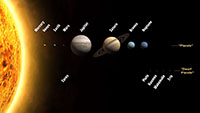Neptune (the planet)
Saturn, Uranus, Neptune and Pluto are the four slow-moving outer planets. When these planets shift from sign to sign, they indicate important changes in society. The type of change depends on the character of the sign.


Neptune is the planet of mysticism, spirituality and illumination. It is also the planet of chaos, confusion, delusion, deception, treachery and scandal. Neptune is associated with all methods of avoiding or escaping reality—the ultimate, of course, being drugs.
Neptune is therefore associated with drug and alcohol abuse and is one indicator of sexual perversion. It rules the ocean, liquids, swamps, drugs, medicines, gases and poisons. In the social sphere it rules democratic and popular movements, the common people, epidemics, social unrest and socialism. Neptune also governs the national taste for music and the arts.
Neptune rules Pisces, the sign that on the positive side indicates liberation through ultimate self-sacrifice, and on the negative side indicates physical or psychological imprisonment due to self-delusion. Neptune rules matters that are often shrouded from public sight but that have physical consequences, such as drug abuse and the transmission of venereal diseases.
Neptune and Communism
We have seen that historically, when combined with Saturn, Neptune is related to the aggressive expansion of World Communism. Saturn and Neptune conjoin each other about every 36 years. The Saturn-Neptune conjunction of 1846 was followed by the publication of The Communist Manifesto by Karl Marx in 1848. The next Saturn-Neptune conjunction, in 1882, coincided with the establishment and growth of the main European socialist parties. The next two conjunctions of Saturn and Neptune coincided with the Bolshevik Revolution in 1917 and with Stalin’s death and Soviet expansion into the Third World in 1953.
When Saturn squared Neptune in 1979, the Soviet Union invaded Afghanistan and became embroiled in a crisis in Poland, and the Sandinistas came to power in Nicaragua and established a Soviet beachhead in the Americas.
Given the strong correlation of Saturn (the planet of organization, planning and centralized control) and Neptune (the planet of glamour, illusion, deception and impractical idealism) with the growth of socialism, it is not surprising that some people were taken in by the promises of socialism.
Socialism is an economic theory based on government ownership of the means of production and distribution of goods. Although socialism is commonly thought of as a political system, or a political and economic system, Marx, Lenin and other seminal theorists insisted that it was first and foremost an economic system. They argued that a nation’s prevailing method of economic organization was the foundation of her political life; if one altered the economic system, the political system would reflect the change. But socialism has never worked. Socialist economies are disorganized (Neptune) and plagued by low levels of production, shortages and the maldistribution of goods (Saturn).
Sources
Pearls of Wisdom, vol. 33, no. 10, March 11, 1990.
Elizabeth Clare Prophet, The Astrology of the Four Horsemen, chapters 7, 19, 24.
